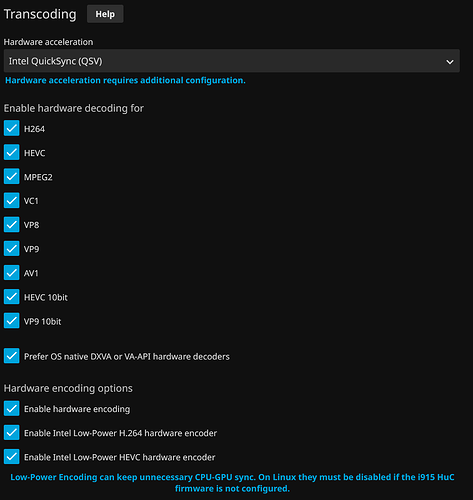Hi everyone,
I’m having a very strange issue with nixos that I can’t seem to generate on another linux OS such as ubuntu or arch.
I have an intel N100 pc with a alder lake GPU with quicksync. I run jellyfin in a docker container on nixos. When I enable OpenCL tone mapping in the docker container, none of my media can play. I see in the jellyfin logs that it doesn’t seem to find an OpenCL device:
root@jelly:/# /usr/lib/jellyfin-ffmpeg/ffmpeg -v verbose -init_hw_device vaapi=va:/dev/dri/renderD128 -init_hw_device opencl@va
ffmpeg version 5.1.4-Jellyfin Copyright (c) 2000-2023 the FFmpeg developers
built with gcc 10 (Debian 10.2.1-6)
configuration: --prefix=/usr/lib/jellyfin-ffmpeg --target-os=linux --extra-libs=-lfftw3f --extra-version=Jellyfin --disable-doc --disable-ffplay --disable-ptx-compression --disable-static --disable-libxcb --disable-sdl2 --disable-xlib --enable-lto --enable-gpl --enable-version3 --enable-shared --enable-gmp --enable-gnutls --enable-chromaprint --enable-libdrm --enable-libass --enable-libfreetype --enable-libfribidi --enable-libfontconfig --enable-libbluray --enable-libmp3lame --enable-libopus --enable-libtheora --enable-libvorbis --enable-libopenmpt --enable-libdav1d --enable-libwebp --enable-libvpx --enable-libx264 --enable-libx265 --enable-libzvbi --enable-libzimg --enable-libfdk-aac --arch=amd64 --enable-libsvtav1 --enable-libshaderc --enable-libplacebo --enable-vulkan --enable-opencl --enable-vaapi --enable-amf --enable-libmfx --enable-ffnvcodec --enable-cuda --enable-cuda-llvm --enable-cuvid --enable-nvdec --enable-nvenc
libavutil 57. 28.100 / 57. 28.100
libavcodec 59. 37.100 / 59. 37.100
libavformat 59. 27.100 / 59. 27.100
libavdevice 59. 7.100 / 59. 7.100
libavfilter 8. 44.100 / 8. 44.100
libswscale 6. 7.100 / 6. 7.100
libswresample 4. 7.100 / 4. 7.100
libpostproc 56. 6.100 / 56. 6.100
[AVHWDeviceContext @ 0x564f45c27cc0] libva: VA-API version 1.20.0
[AVHWDeviceContext @ 0x564f45c27cc0] libva: Trying to open /usr/lib/jellyfin-ffmpeg/lib/dri/iHD_drv_video.so
[AVHWDeviceContext @ 0x564f45c27cc0] libva: Found init function __vaDriverInit_1_20
[AVHWDeviceContext @ 0x564f45c27cc0] libva: va_openDriver() returns 0
[AVHWDeviceContext @ 0x564f45c27cc0] Initialised VAAPI connection: version 1.20
[AVHWDeviceContext @ 0x564f45c27cc0] VAAPI driver: Intel iHD driver for Intel(R) Gen Graphics - 23.4.0 (05e4d0d).
[AVHWDeviceContext @ 0x564f45c27cc0] Driver not found in known nonstandard list, using standard behaviour.
[AVHWDeviceContext @ 0x564f45c57940] Failed to get number of OpenCL platforms: -1001.
Device creation failed: -19.
Failed to set value 'opencl@va' for option 'init_hw_device': No such device
Error parsing global options: No such device
Nixos config. I’ve tried both with only adding in the onevpl-intel-gpu package, not adding that in, adding that in and removing intel-media-driver package, all same issues.
hardware.opengl = {
enable = true;
extraPackages = with pkgs; [
intel-media-driver
intel-compute-runtime
vaapiVdpau
libvdpau-va-gl
vaapiIntel
intel-ocl
# Intel Video Processing Library (VPL) API runtime implementation
# replace with`onevpl-intel-gpu` after https://github.com/NixOS/nixpkgs/pull/264621
(pkgs.callPackage ./onevpl-intel-gpu.nix { })
];
};
Docker compose, i pass the intel gpu through by passing through /dev/dri. This docker compose has been used on a ubuntu server system as well for months with no issues.
jellyfin:
container_name: jellyfin
image: jellyfin/jellyfin
restart: always
network_mode: service:tailscale-jellyfin
environment:
- TZ=Europe/Brussels
volumes:
- jellyfin:/config
- /tmp:/cache
- movies:/movies
- tvshows:/tv
- /dev/shm:/dev/shm
devices:
- /dev/dri:/dev/dri
On ubuntu or arch running the same docker compose setup, jellyfin docker does recognize an OpenCL device. Jellyfin docker logs on ubuntu server
[AVHWDeviceContext @ 0x5615fea0e100] libva: VA-API version 1.20.0
[AVHWDeviceContext @ 0x5615fea0e100] libva: Trying to open /usr/lib/jellyfin-ffmpeg/lib/dri/iHD_drv_video.so
[AVHWDeviceContext @ 0x5615fea0e100] libva: Found init function __vaDriverInit_1_20
[AVHWDeviceContext @ 0x5615fea0e100] libva: va_openDriver() returns 0
[AVHWDeviceContext @ 0x5615fea0e100] Initialised VAAPI connection: version 1.20
[AVHWDeviceContext @ 0x5615fea0e100] VAAPI driver: Intel iHD driver for Intel(R) Gen Graphics - 23.4.0 (05e4d0d).
[AVHWDeviceContext @ 0x5615fea0e100] Driver not found in known nonstandard list, using standard behaviour.
[AVHWDeviceContext @ 0x5615fea3dc40] 0.0: Intel(R) OpenCL Graphics / Intel(R) UHD Graphics
[AVHWDeviceContext @ 0x5615fea3dc40] Intel QSV to OpenCL mapping function found (clCreateFromVA_APIMediaSurfaceINTEL).
[AVHWDeviceContext @ 0x5615fea3dc40] Intel QSV in OpenCL acquire function found (clEnqueueAcquireVA_APIMediaSurfacesINTEL).
[AVHWDeviceContext @ 0x5615fea3dc40] Intel QSV in OpenCL release function found (clEnqueueReleaseVA_APIMediaSurfacesINTEL).
So weird that the underlying OS can have an influence on a passed through GPU in a docker container … Anybody having the same issue?
